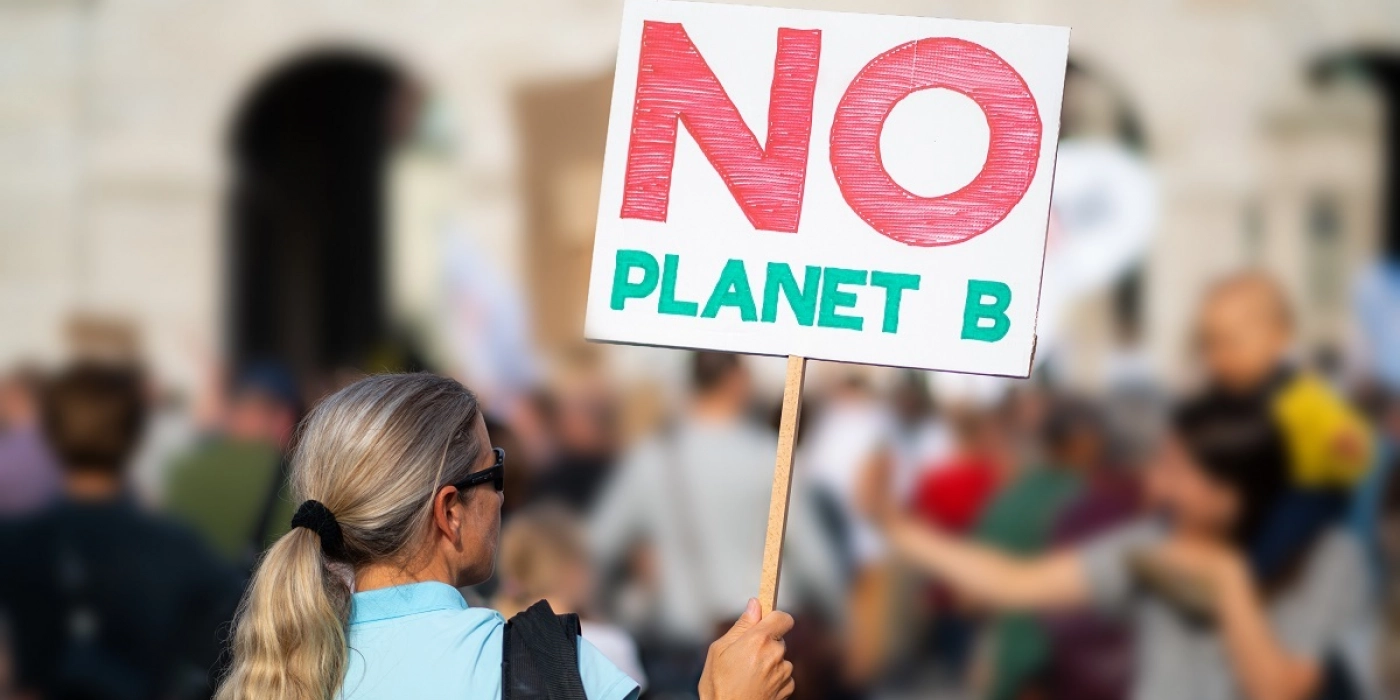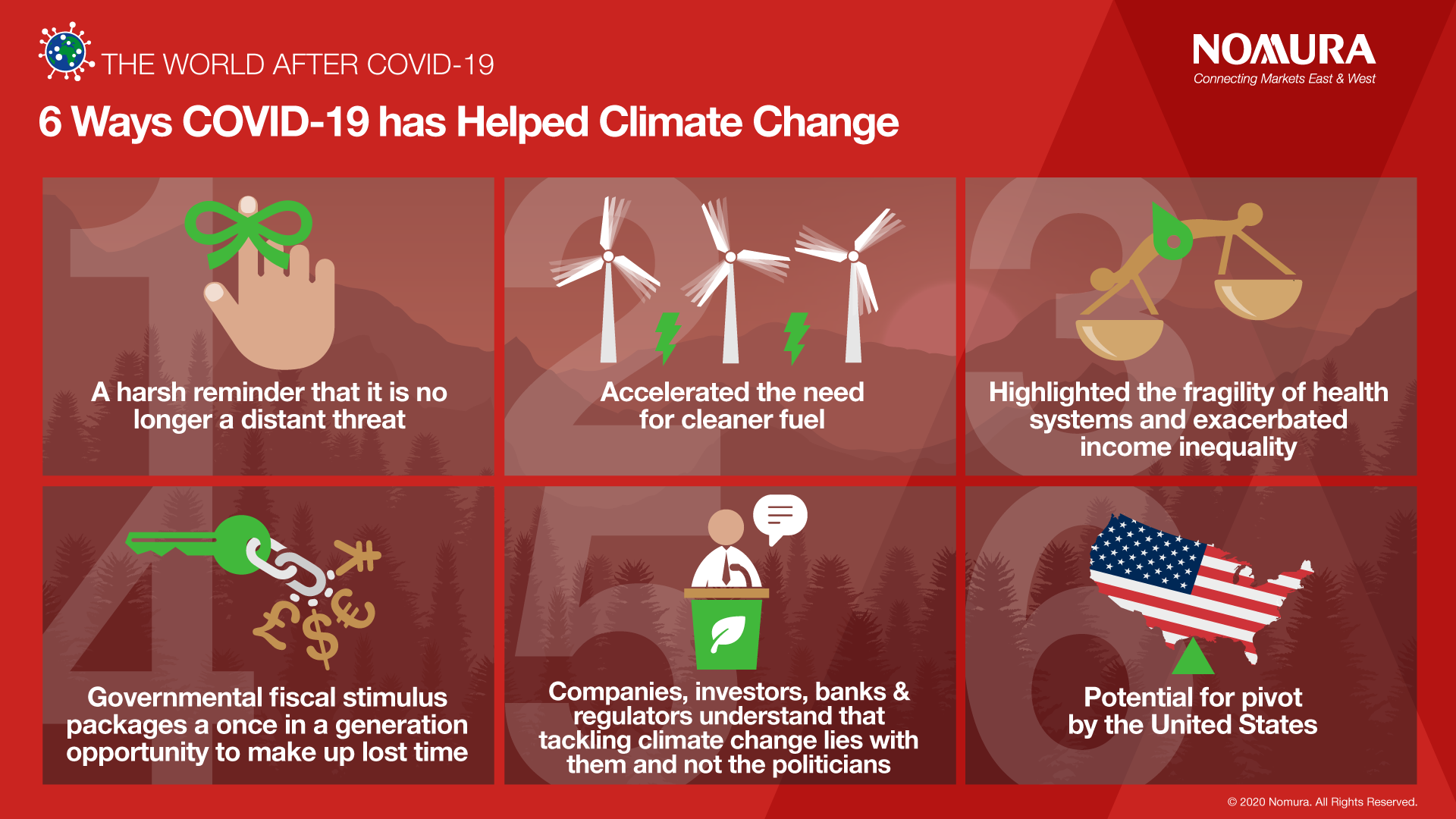Central Banks | 3 min read July 2020

Geopolitics | 4 min read | August 2020
Covid-19 a blessing in disguise for climate change?
We look at 6 ways that COVID-19 has helped address key issues in climate change.

Geopolitics | 4 min read | August 2020
We look at 6 ways that COVID-19 has helped address key issues in climate change.
Some might argue that the health crisis has reduced the priority to tackle climate change, and it could be difficult to resurrect concerted action.
However we believe the economic reset will act as a blessing in disguise; the global crisis is uniting a clarion call for action against climate change. Here are six reasons why

First, we believe 2020 will be remembered as the year that squashed the perception that climate change is a distant threat: COVID-19 has been a harsh reminder of the frailty of humankind in the face of ‘natural’ forces. The solidarity gained during global lockdown is a valuable foundation for the new narrative: tackle climate change now, not later.
Second, COVID-19 was a much more sudden, severe and global shock than the Global financial Crisis. Despite the low cost of oil, demand for fossil fuel-related production and services, notably transportation, is set to remain subdued until a vaccine becomes readily available. This is accelerating the transition to cleaner energies, as oil and gas producers are so stretched that industry consolidation seems inevitable.
Third, COVID-19 has exposed the fragility of health systems and exacerbated income inequality. There is a growing recognition that these two top global concerns are irrevocably linked to climate change. Take deforestation. It accelerates global warming but also forces animals to migrate to new habitats, raising the risk of the spread of disease. This correlates with the increased frequency of epidemics – SARs, MERs, Ebola, Avian flu – originating from wild animals. Another example is how the richer countries are responsible for the majority of greenhouse gas emissions, yet it is the poor countries that rely on agriculture for livelihood.
Fourth, as governments around the world embark on fiscal stimulus packages on a scale witnessed only in times of war, this could be a once-in-a-generation opportunity for them to catch up on lost ground to address climate change. The fiscal packages should include retrofitting cities with new smart grid infrastructure technology to handle renewable energy, expanding charging stations for electric vehicles (EVs), investing heavily in 5G to increase digital connectivity and reduce transportation traffic, and more R&D in cutting edge areas like renewable energy storage, carbon capture and clean hydrogen.
Fifth, even before the advent of COVID-19, companies saw value in a greener economy and were starting to implicitly understand that successfully tackling climate change was unlikely if it was left only to the politicians. The world in crisis now presents a unique opportunity to achieve collective action against climate change. The financial system too can play a more powerful role in producing a greener planet once all the participants – investors, banks and regulators – are united. The perception of ESG investing is changing from being a social good to one that can produce higher long-term, risk-adjusted, returns for investors. The financial system, through market discipline and stakeholder activism, could turn out to be more powerful than government policy in promoting a greener planet
Regulators, recognizing the systemic financial risks from climate catastrophe, are now requiring companies to increase disclosure on their carbon footprint, and banks to integrate climate risks as part of their capital adequacy assessment process. For investors, we believe the market for ESG investing has never been more favourable. ). Increased requirements for companies to disclose their carbon footprint will allow asset managers to make more informed decisions on the environmental sustainability of their investments. Companies will have more incentive to disclose their lower carbon footprints, as banks will increasingly deem them as lower risk allowing them to access cheaper loans.
Sixth, is the potential for a major pivot by the US? The Trump administration in 2017 announced that the US would cease all participation in the Paris Agreement. The inflexibility of the US has severely hampered global cooperation to tackle global warming. The 3rd November US presidential election could potentially change all that if Mr. Biden is elected. Biden’s campaign pledge is to “Ensure the US achieves a 100% clean energy economy and reaches net-zero emissions no later than 2050” which is essentially the same target as the EU and seems a clear declaration that, if he wins, the US will return to the Paris Agreement. The US and EU moving in lockstep to tackle climate change would be a game changer, adding to the blessing in disguise of COVID-19.
For further insight on the world post Covid-19, read our full report here.

Head of Global Macro Research

Chief Market Economist, Japan

Macroeconomic Research Analyst, Asia ex-Japan
This content has been prepared by Nomura solely for information purposes, and is not an offer to buy or sell or provide (as the case may be) or a solicitation of an offer to buy or sell or enter into any agreement with respect to any security, product, service (including but not limited to investment advisory services) or investment. The opinions expressed in the content do not constitute investment advice and independent advice should be sought where appropriate.The content contains general information only and does not take into account the individual objectives, financial situation or needs of a person. All information, opinions and estimates expressed in the content are current as of the date of publication, are subject to change without notice, and may become outdated over time. To the extent that any materials or investment services on or referred to in the content are construed to be regulated activities under the local laws of any jurisdiction and are made available to persons resident in such jurisdiction, they shall only be made available through appropriately licenced Nomura entities in that jurisdiction or otherwise through Nomura entities that are exempt from applicable licensing and regulatory requirements in that jurisdiction. For more information please go to https://www.nomuraholdings.com/policy/terms.html.
Central Banks | 3 min read July 2020
Economics | 21 min podcast July 2020